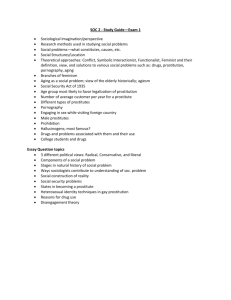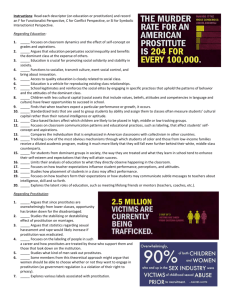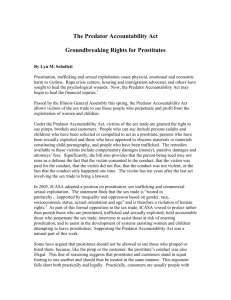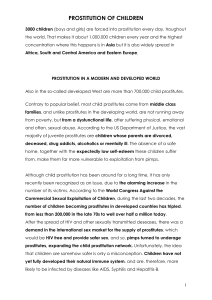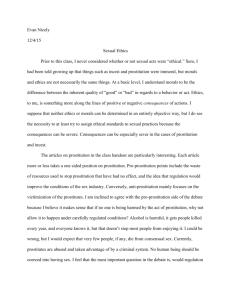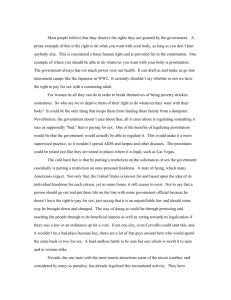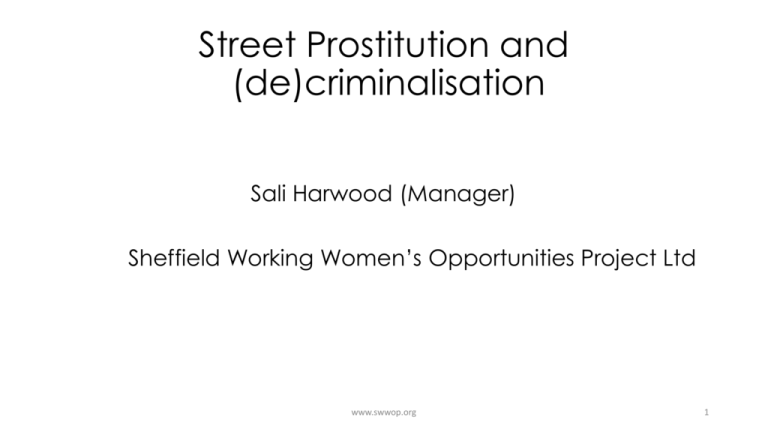
Street Prostitution and
(de)criminalisation
Sali Harwood (Manager)
Sheffield Working Women’s Opportunities Project Ltd
www.swwop.org
1
This presentation will
• Take a quick look at prostitution in the UK, and the law in
England
• Focus in more detail on street prostitution in Sheffield and
SWWOP’s role
• Consider local approaches to regulating street prostitution
in the last twenty years
• Examine recent contrasting approaches to
decriminalisation of prostitution in Sweden and Germany
• Discuss the effectiveness of (de)criminalisation
approaches in safeguarding street prostitutes
www.swwop.org
2
What is prostitution?
Prostitution is commonly defined as:
The exchange of sexual services for some form of payment
– usually money but could be drugs, accommodation,
food etc.
www.swwop.org
3
Prostitution law
Prostitution per se is not illegal in England and Wales….
however, certain activities are, including:
• Soliciting or loitering in a public place
• Kerb-crawling
• Living off immoral earnings
• Trafficking
So who is affected by criminalisation?
www.swwop.org
4
Prostitution, not sex work?
The importance of terminology:
The term ‘sex work’ implies that women have made a
rational choice to sell sex
SWWOP views prostitution as exploitation of women
www.swwop.org
5
Commercial Sex markets
Home office estimate: 88,000 women involved in UK
Hierarchy of prostitution:
•
Life style choice/variations in earnings
•
Agencies, saunas & brothels
•
At the bottom - street prostitutes
www.swwop.org
6
Sex work vs street prostitution: who is most affected
currently in England and Wales by criminalisation?
• High Class Prostitutes?
• Escorts?
• Madams?
• Pimps?
• Street Prostitutes?
• Punters?
www.swwop.org
7
Street prostitution in Sheffield
Brief Overview:
• How many women
• Ages and ethnicity
• Reasons given for involvement
www.swwop.org
8
What SWWOP offers
• Mobile outreach service
• Follow-on support & crisis intervention
• Exit support programme for women to leave street
prostitution
www.swwop.org
9
Realities of women’s lives
• Physical deprivation – homelessness, lack of food
• Violence – physical and sexual assaults
• Illness and injury – increase in risk taking behaviour
increases risk of harm
• Drug and alcohol abuse
• Isolation / ostracisation / social exclusion – impact on
mental and emotional health
• All on top of whatever life experiences led to prostitution in
first place
www.swwop.org
10
Local approaches to (de)criminalisation over
the last 20 years
Prostitutes
Punters
• Arrest & Fines
• ASBOs
• Tolerance Zone
Proposal
• Arrest & ESOs
• No action
• Traffic control measures
• Shaming/naming
• Letters Home
www.swwop.org
11
Impact of local approaches on:
Street prostitutes
Punters
• Arrest and fines – revolving door
• ASBOs – increased potential
penalties (up to 5 years
imprisonment for infringement);
drove activities underground;
moved women into less safe areas
• Tolerance zone – much discussion,
never a formal agreement
• Arrest and ESOs (engagement and
support order)
• Traffic control – moves activities to
new areas
• Naming/shaming – not rigorously
enforced, little effect
• Letters home – ditto
www.swwop.org
12
Is de(criminalisation) a local priority?
• Policing of prostitution usually comes low down on list of
priorities compared to e.g. burglary
• Discussion about new approaches usually linked to
regeneration initiatives etc. – depends on level of political
interest
• Murders get coverage but premature deaths don’t – five
street prostitutes (under 40) are known to have died in
Sheffield this year
www.swwop.org
13
Contrasting international approaches
to decriminalisation
Two examples of differing approaches to decriminalisation:
• Sweden (Nordic Model)
• Germany
www.swwop.org
14
Sweden (Nordic Model)
• A human rights and gender equality-based approach also
known as the ‘Swedish model’.
• A set of laws and policies which penalises the demand &
decriminalises individuals in prostitution
• Main Goals:
Curb demand
Promote equality
www.swwop.org
15
Market principles of supply and
demand.
• Demand is created by the (mainly) men who pay for
commercial sex. Traffickers, pimps, brothel owners and
other facilitators profit from this demand by supplying the
women and girls who are exploited every day in the
commercial sex industry.
• Sex trafficking does not just exist because its victims are
vulnerable - it exists because there is a demand for
commercial sex that traffickers can exploit and profit from.
www.swwop.org
16
SwedenDecriminalised the selling of sex but criminalised the
buying of sex
Prostitution is considered to be a social problem, and
the law criminalizes the purchasers of sexual services in
an attempt to reduce demand and change attitudes
• NB numbers of women involved initially increased but then
dropped
www.swwop.org
17
Swedish approach
Pros
Women escape revolving
door of arrest & punishment
Support services available
for those wishing to exit
Trafficking rates decreased
Cons
Demand remains
Activities driven
underground, with increased
isolation and risk
Stigma still exists
www.swwop.org
18
Germany
Legal to buy or sell sex:
Intended to empower & safeguard prostitutes by strengthening their
legal position
Germany legalised prostitution 2002 & it is now recognised as a
regular job like any other. Sex workers now enter into employment
contracts, pay tax, register for health insurance, pension plans & other
benefits, and can sue for payment.
Exploiting women and children is still criminal
www.swwop.org
19
German approach
Pros
Not caught up in judicial system
Should be safer with protection of
law
Eligible for pensions etc.
Can get help with moving into
other employment
Numbers of German prostitutes
may have reduced
Cons
Few women have registered for
national insurance (44 in Nov ‘13)
Has opened doors for other EU
migrants to work – may have
increased trafficking
Critics say now ‘bordello of
Europe’
Social stigma still exists
www.swwop.org
20
So… who would benefit most from
decriminalisation or legalisation here?
• High Class Prostitutes?
• Escorts?
• Madams?
• Pimps?
• Street Prostitutes?
• Punters?
• Traffickers?
• Who is likely to have the most influence on policy making?
www.swwop.org
21
What has worked in Sheffield so far?
Protecting and supporting street prostitutes within the
existing system has been helped by:
• Good partnership working with police and magistrates
• Proactive support from other agencies (health, housing,
prisons etc.)
You can make most systems work for good or bad
depending on how they’re implemented – but this doesn’t
change attitudes
www.swwop.org
22
What system would I advocate?
• Personally I would to see the ‘Nordic Model’ tried in Sheffield.
• Why- Because I believe prostitution is exploitation and this model is
designed to change attitudes and behaviours.
• I would also like to see more work through education with young
people on respecting and empathising with others in regards to all
sorts of relationships
• In the interim I would like to see the Merseyside Model
http://ruthjacobs.co.uk/2013/03/04/cry-for-the-merseyside-model-crimes-against-sex-workers-must-be-treated-as-hate-crimesuk-wide/-
• It remains to be seen how effective decriminalisation is in changing
attitudes and behaviour
www.swwop.org
23
Links for prostitution policy articles
• Kilvington et al Prostitution Policy in Europe: a time of change
• http://myweb.dal.ca/mgoodyea/Documents/Europe/Prostitution%20policy%20in%20Europe%20A%20time%20of%20C
hange%20Kilvington%20Fem%20Rev%20%202001%20Spring%2067%2078-93.pdf
• Sanders & Campbell Designing out vulnerability, building in respect: violence, safety and sex work policy
• http://myweb.dal.ca/mgoodyea/Documents/Health%20and%20wellbeing/Designing%20out%20vulnerability%20Sand
ers%20Br%20J%20Sociol%202007%2058(1).pdf
• BBC News German prostitutes in rights plea
• http://news.bbc.co.uk/1/hi/world/europe/4111738.stm
• Prof. Dr. Barbara Kavemann, Ass. jur. Heike Rabe with the collaboration of Dipl. Soz. Päd. Claudia Fischer
• The Act Regulating the Legal Situation of Prostitutes – implementatio, impact, current developments
• http://www.cahrv.uni-osnabrueck.de/reddot/BroschuereProstGenglisch.pdf
www.swwop.org
•
24
Cont.
• Miriam Schimannek
Impact of Prostitution Policies in Receiving Countries on Trafficking in Human Beings for the Purpose of Sexual Exploitation
at the Examples of Germany and Sweden
• http://essay.utwente.nl/60186/1/BSc_M_Schimannek.pdf
• The Local 3.7.10 Sweden's prostitution law a success: report-http://www.thelocal.se/27580/20100703/
•
Julie Bindel and Liz Kelly-
•
A Critical Examination of Responses to Prostitution in Four Countries: Victoria, Australia; Ireland; the Netherlands; and
Sweden
• http://www.glasgow.gov.uk/nr/rdonlyres/c19e010b-1a4f-4918-97bd-f96af7d7f150/0/mainreport.pdf
• Dana Lynn Radatz Systematic approach to prostitution laws : a literature review and further suggestions
• http://commons.emich.edu/cgi/viewcontent.cgi?article=1230&context=theses
http://www.policingtoday.co.uk/victimcentred_83296.aspx (The Merseyside Model)
www.swwop.org
25

